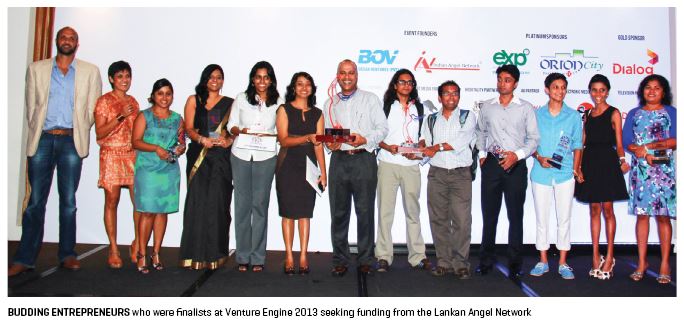Adolescent strivers are starting to change the way business has been done in Sri Lanka, introducing new efficiency by throwing technology in to the mix, challenging established models with fresh thinking and creating and capturing value at a dizzying pace. Against odds, the start-up scene in Sri Lanka took off two years ago on the clutches of a generation of bright young people choosing entrepreneurship over jobs here or overseas. However, few survive the start-up phase, most commonly because entrepreneurial zeal wanes against the tremendous odds of breaking in to a market with an unavoidable lack of knowledge while trying to implement an unproven business plan. Secondly, entrepreneurs struggle to finance ventures beyond what their savings, friends and family can afford to pocket out. There is a limit to these sources and the gulf between these and the capital market – the other proven funding source for businesses – is the equity gap.
The equity gap exists because the two equity sources – an entrepreneur’s & his network and the capital market – don’t overlap. Since few businesses have grown big enough or choose to list here and as the venture capital industry is almost nonexistent, firms here usually operate in a perpetual state of undercapitalization.
In more sophisticated markets venture capital and private equity help bridge this gap. Here the equity gap is wide with entrepreneurs having to entirely depend on retained profits and bank borrowing for growth. But start-ups are rarely profitable and banks aren’t comfortable lending to unproven ventures with weak cash flow and no assets to pledge as collateral. Undercapitalized companies have been a feature of the Lankan economy as is the case in many poor countries. The result of the low level of economic sophistication is that attracting overseas investments are challenging, making capital both expensive and scarce while the government continues to grab a large share of what little is available.
So when a business does find traction here but runs out of precious owner financing, it usually settles in for a long hard slog to dethrone market dominants, because anaemic cash flows won’t allow growth at optimum levels. At least that’s how things have worked for most start-ups of the past.
Young start-ups – which aren’t large enough for venture capital financing – now have the option of angel investors who, besides investing small amounts of equity, are willing to roll up their sleeves to advise and lend a hand to entrepreneurs. The analogy of Angels applied to investors in high risk projects comes from Broadway where wealthy people – who see themselves as patrons of the arts – bankroll risky theatre productions. These usually elderly Broadway angels didn’t always get their money back but occasionally struck gold with some bright producer who makes it big or because a beautiful young actor gets in to a sugar daddy or mommy relationship with the investor.
Business angels now are less star-struck and are often rich executives or themselves entrepreneurs interested in start-ups for reasons that go beyond pure monetary return. They are usually seeking to keep abreast of developments in a particular business arena and are individuals who gain satisfaction by mentoring another generation of entrepreneurs and allowing these start-ups to leverage their experience and network.
Here they are organised as the Lankan Angel Network (LAN) established in 2012. Start-ups didn’t have organised channels to meet angel investors before LAN – consisting over 50 angel investors with experience as varied as telecoms, fashion, financial services, manufacturing, tourism and knowledge services – was set up. Angel networks allow part time investors syndicates to spread their risk and take part in a big opportunity without having to mortgage the house. Such angel networks, bringing together a handful of investors or in some cases several hundred, are fairly common elsewhere in the world.
The start-up buzz – to which the Lankan Angel Network has considerably contributed – has made entrepreneurship cool and is now drawing closeted talent. Over 120 entrepreneurs pitched business ideas for the Venture Engine’s 2013 edition which concluded in June. Lankan Angel Network’s members are forecast to invest between Rs100 to 150 million in the 10 Venture Engine finalists and other start-ups this year.
Even Sri Lankan ecommerce veterans like Eric Wikramanayake counts his recent involvement with the Angel Network – as chairman of its board and an investor – as “probably the most rewarding thing I have done in a long time is to see these young guys coming up.” Wikramanayake has been flirting with entrepreneurship since he was 21 years old. In 2006, roomsnet.com – a hotel booking engine he built from Colombo – which predates sites like agoda.com and expedia.com – received a multimillion dollar buyout offer which he foolishly turned down. Roomsnet.com had $30 million annual revenue at its peak. “In hindsight I should have taken that offer,” he says regretfully. Subsequently investment firm ERI PLC acquired control of roomsnet.com investing Rs200 million in to the business. Wikramanayake is now ERI chief executive who is restructuring the company.
 If LAN members are Archangels to start-ups, then Prajeeth Balasubramaniam is Gabriel. Balasubramaniam, who had returned from overseas to take over the family business in 2002, received queer looks and rejection when at that time he asked start-ups if they ‘wanted some money?’ The big break came after Balasubramaniam in 2010 – against advice, established Blue Ocean Ventures (BOV) partnering Rajan Anandan, Google India’s Managing Director and part of the Indian Angel Network. “Lots of people said this has been done before and it won’t work,” confesses Balasubramaniam. “I didn’t give up.”
If LAN members are Archangels to start-ups, then Prajeeth Balasubramaniam is Gabriel. Balasubramaniam, who had returned from overseas to take over the family business in 2002, received queer looks and rejection when at that time he asked start-ups if they ‘wanted some money?’ The big break came after Balasubramaniam in 2010 – against advice, established Blue Ocean Ventures (BOV) partnering Rajan Anandan, Google India’s Managing Director and part of the Indian Angel Network. “Lots of people said this has been done before and it won’t work,” confesses Balasubramaniam. “I didn’t give up.”
Getting Indians investing in the start-up scene triggered off interest here. “That was a classic move,” points out Ruwindhu Peiris, a director of the Lanka Angel Network. “Nothing like bringing Indians into the scene to get our local guys activated. As soon as they found out that Indians are trying to make money here, out went the reluctance to take risks,” says Peiris of LAN which now has seven directors including the five pioneering members.
Prajeeth and Rajan‘s Blue Ocean Ventures and other partners’ business plan competition, Venture Engine, in 2012 was a roaring success not just for the nine firms that got over Rs100 million in angel funding but due to the electrifying effect the competition had on the start-up scene here. Up till then most start-ups didn’t know how to access the scattered part time angels and when they did, lacked the charm to get investors to prise open their wallets.
Often what angels seek out in a start-up aren’t the strengths that entrepreneurs at first think are their best assets. In the start-up world having a good idea is the easy part – but often entrepreneurs think this to be their prized assets. “Most entrepreneurs think they are the only ones with the idea, and I keep telling them it’s not about the idea, it’s about how quickly you can execute,” contends Prajeeth Balasubramaniam whose Blue Ocean Ventures has invested up to Rs50 million in businesses including leading a consortium to acquire a controlling stake in Sunshine Travels and Tours, which is a fairly mature business. Essentially, angel investors seek entrepreneurs able to take advantage of their unique circumstances founding ventures that can then create scale.
Mafaz Ishaq, a founding director of LAN and a director of Calamander Capital, a Singapore-based private equity fund, admires what he calls the ‘can do mentality’ of Sri Lankans, despite the very negative impact to such uplifting life attitudes a near three decade-long war may have had. He points out that Sri Lankans are more likely to respond with a firm ‘sure’ to a request compared to some cultures where a positive response is much harder to elicit straight-off.
Ishaq has a penchant for counter – culture venture investments. So far investments reinforcing this theme include surf wear brand Dunstan’s Board Shorts and Push Skateboards which made the top 10 shortlist for the Venture Engine 2013 business plan competition.
Angels are prepared to invest in risky ventures and don’t operate by rules typical of capital markets especially regarding valuations, which is more gut feel because in a start-up it’s almost impossible to forecast revenue, leave alone a bottom-line.
The budding crop of entrepreneurs however are rather impatient to create and capture value as quickly as possible and are confident enough to take on the added burden of shareholders and the challenge of managing varying views that brings, to grow the pie quickly. New disruptive technologies offer global potential for businesses and locally to disrupt established ways of doing things.
So debate is intense when entrepreneurs sit with potential angel investors to work out a valuation – often for an idea that hasn’t been implemented. Naturally entrepreneurs think no end of their ideas and how easily those can be scaled up. “Valuation is the most subjective area of investment,” agrees Ishaq, who has negotiated a number of deals as an angel investor and on behalf of LAN members and Calamander. “When you start looking at the value of a company, for me the judgment is whether the entrepreneur is able to execute and stay focused on this in the long haul,” according to Ishaq.
Perhaps LAN’s star investment in 2012 was experiential tours and activities site Trekurious. Ishaq says the firm’s $130,000 (Rs16 million) valuation for a start-up that only had a business plan, was a record. Generally, he says start-ups here tend to be valued at $50,000 to $100,000. A company with some traction, clear growth potential and with less than a year’s revenue could fetch a valuation of $100,000 to 400,000, he thinks.
However, risk appetites and opinions about valuations can differ among LAN members. Ridgecrest’s Chief Executive and LAN founding member Sanath Fernando like to quote Steve Jobs, “I want to put a ding in the universe.” Ridgecrest is building a platform on which it intends to run products that are useful to both individuals and companies, like an app that tracks mobile phone usage and compares it with the actual bill, a corporate payroll management product, online ticket sales and maybe even an online taxi management network.
“In this region radical change is possible because you have that opportunity to leap ahead,” says the Silicon Valley veteran who was part of a start-up team at pioneering online investment bank Epoch Partners which was purchased by Goldman Sachs for $220 million in 2001 and shut down. Although a founder, he hasn’t invested in any ventures LAN supported so far but estimates investments top $1.5 million in those Ridgecrest promoted.
Sanath Fernando attaches Silicon Valley type valuation definitions to start-up success here. He is banking on one in 10 of his firms achieving a $50 million valuation in five years. Other LAN members – who agree that only one or two investments in ten will be stars – say a return of between five to ten times the investments would be fantastic in three to five years. Essentially, a star company is one that achieves a valuation of something in excess of Rs50 million in five years based on LAN members making a first round investment of around Rs2 -6 million for a 20% – 30% equity stake.
Between them the 50 members of LAN are an informal capital market that’s getting the innovation machine moving. Its seven member board includes the five founders and is chaired by Eric Wikramanayake. Its membership now meets ever second Thursday of a month to hear potential entrepreneurs pitch ideas for new ventures. LAN members wishing to pursue an investment appoint a lead to negotiate with an entrepreneur they may like to partner to discuss valuation and fine tune the strategy. “It isn’t about the money,” contends Apurva Udeshi, a LAN founder and director.

Besides financing, it’s the marketing that challenges most start-ups. Geeks – who are behind some firms, especially ones dealing with technology – struggle to come across well in slick, fast-paced business circles. LAN membership tries to counter these challenges for business they have partnered by carefully choosing its membership to include only those willing to give of their time for mentorship, facilitating access to their networks and willing to hand hold these companies to the next stage.
LAN network support is crucial because an entrepreneur’s life can sometimes be a lonely one, with 16-hour holiday free work. Chances of their wife leaving them, the bank freezing the credit card and ending up living at office, are fairly high possibilities for those striking out on their own. So besides the help, the encouragement angels can offer may prove crucial to keep a start-up on course. When the time comes for venture capital or private equity to step in the angels can help a firm strike a better deal. Apurva manages an Udeshi family private equity fund. The Udeshis own Siedles, a firm that’s managed the local Sony dealership for decades. He is keener to make larger investments than are being done by LAN consortia so far, for the PE fund. “That’s where we can add value; down the line in a second or third round of financing before an IPO or a strategic sale,” adds Apurva.
Although there is now overwhelming demand, new LAN memberships have been frozen and the board will soon introduce a code of conduct for its current lot. While governance on the part of angels is being codified entrepreneurs have had to meet high standards throughout. Angels, through board representation, closely monitor their investments. Although angels don’t build in consequences for the entrepreneur for not meeting milestones, they may insist a failing business be wound down.
 Venture capital firms sometimes impose strict conditions to protect the value of shares on entrepreneurs. If commercial targets are missed entrepreneurs may find clauses in the shareholders agreement will deny their voting rights and which may even deny them employment in firms they have founded.
Venture capital firms sometimes impose strict conditions to protect the value of shares on entrepreneurs. If commercial targets are missed entrepreneurs may find clauses in the shareholders agreement will deny their voting rights and which may even deny them employment in firms they have founded.
Jeevan Gnanam, another LAN co-founder, has been turning around the fortunes of some family businesses including the Anton brand and converting a disused former textile factory into an IT park. He says for instance the Anton brand was dying a few years ago. “People were comparing us to second or third grade manufacturing companies, we were in bloody waters,” he says. However, the brand has now turned a corner and is back in the black. With the angel network, entrepreneurs have the ability to benefit from input of turnaround specialists and others with a host of other skills.
LAN offers real high risk capital, something the venture capital industry here has failed miserably to provide in the past. For those angel investments that succeed, how more funding can be raised is still unclear. There are signs that private equity funds may soon be available in Sri Lanka. In India, successful start-ups have been able to attract venture capital funding in two years. Here it may take longer.
Prajeeth Balasubramaniam says he can’t pinpoint yet how exits for angel investors are going to happen. “We need to show our first exit, then people will realize that these guys can take a firm from seed capital to IPO,” he says but adds ‘I have a good feeling about this’ referring to exits.

